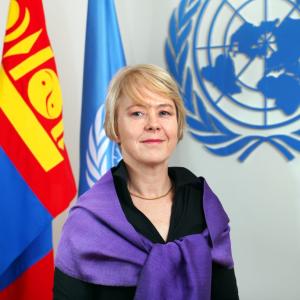Your Excellency Mr Tsogtbaatar, Minister of Foreign Affairs
Mr Byambadorj, Chief Commissioner of the National Human Rights Commission
Ladies and Gentlemen, colleagues and friends,
I am delighted to join you for this important event. In a few days we are celebrating International Human Rights Day. This year we also celebrate the 70thanniversary of the Universal Declaration of Human Rights.
In an era where our news are dominated by conflicts, wars and mass displacements and when human rights are under threat in many parts of the world due to populist politics, the UDHR remains as relevant as ever.
Human rights have long been the foundation of human development. The declaration was drafted in an effort to build a better world: a world of peace and prosperity, cooperation and progress. Its authors knew that those dreams can only be realized when the rights of every person are recognized.
Human rights are key to achieving the Sustainable Development Goals for 2030 – to end poverty and build societies that include everyone, and a planet that can sustain everyone. At the heart of the global goals is a promise: to leave no one behind. This principle can only be achieved if human rights, equality and inclusion are put at the center of development.
Mongolia has made good progress in advancing human rights, since its transition to democracy a quarter of a century ago. It is one of just six democracies ranked as ‘free’ in the Asia Pacific by the 2018 Freedom House Report. Mongolia also abolished the death penalty last year, and recently adopted laws to protect children, seniors, and people with disabilities. It is an active member of the UN Human Rights Council and was one of just three Asian countries to support the Council’s mandate to enable better human rights protection of Lesbian, Gay, Trans and Intersex people (LGBTI).. Last year, Mongolia also enacted the Law to Combat Domestic Violence, criminalizing domestic violence for the first time.
But like many countries around the world, challenges to fully realising human rights remain. Existing laws must be implemented, and safeguards must be made accessible. Human rights education also has a vital role to play, to raise human rights awareness and create public demand for their enforcement and protection.
Let me illustrate this by a few examples that are focus areas of the UN’s human rights work in Mongolia:
Take domestic violence. Two in three Mongolian women have experienced some form of domestic violence, including emotional and economic abuse. One third has been subjected to physical violence. But not all families are aware of what ‘domestic violence’ means. And not all police are trained in how to respond.
Greater public awareness and education is also needed in defending rights of minorities, such as LGBTI people. While discrimination was included as an offence in the new criminal code, the safety, employment, media portrayal, health and wellbeing of LGBTI people remain at risk.
Child rights are another issue, in particular, with regards to child jockeys. Children participating in horse races during Nadaam has a long tradition in Mongolia. Nowadays races are however becoming increasingly commercialized and are also held in winter. This puts children in serious danger by being exposed to weather hazards, severe injuries and even death. This is why the UN Committee on the Rights of the Child urges to abolish this practice.
In other words, we need stronger human rights and civic education across society, to protect the fundamental rights of all vulnerable groups – from domestic violence survivors, to the LGBTI community and children. Only then can demands for enforcement be made, and heard.
The UN’s long-standing World Programme for Human Rights Education provides a platform for advancing human rights awareness, and a framework for action. The programme focuses on strengthening rights knowledge among students, teachers, civil servants, law enforcement officers and the military, as well as human rights training for media professionals.
In line with the logic of the World Programme, the UN in Mongolia has been supporting the National Commission on Human Rights and the Ministry of Education, Culture, Science and Sports in their efforts to strengthen human rights education. We also advised universities to increase teaching time on human rights, with some now offering elective courses in this area.
All our agencies are stepping up. For example, UNDP trained 60 journalists from all 21 aimags on human rights and the SDGs this year, while UNFPA and WHO supported the re-introduction of sexual and reproductive health lessons in high school curriculums, from this year. UNFPA also advised its partners nationwide on gender equality education, as well as combatting gender-based violence and domestic violence.
How a society treats its minorities and vulnerable reflects its maturity. The 70th anniversary of the UDHR is an opportunity for Mongolia to renew its commitment to protect the rights of all its people, and the UN stands ready to support it. Thank you.


